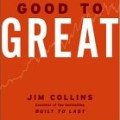Good to Great
Chapter One.
Good is the Enemy of Great. That's what makes death so hard -- unsatisfied curiosity. --Beryl Markham,West with the NightGood is the enemy of great.
And that is one of the key reasons why we have so little that becomes great.
We don't have great schools, principally because we have good schools. We don't have great government, principally because we have good government. Few people attain great lives, in large part because it is just so easy to settle for a good life. The vast majority of companies never become great, precisely because the vast majority become quite good -- and that is their main problem.
This point became piercingly clear to me in 1996, when I was having dinner with a group of thought leaders gathered for a discussion about organizational performance. Bill Meehan, the managing director of the San Francisco office of McKinsey & Company, leaned over and casually confided, "You know, Jim, we love Built to Last around here. You and your coauthor did a very fine job on the research and writing. Unfortunately, it's useless." Curious, I asked him to explain.
"The companies you wrote about were, for the most part, always great," he said. "They never had to turn themselves from good companies into great companies. They had parents like David Packard and George Merck, who shaped the character of greatness from early on. But what about the vast majority of companies that wake up partway through life and realize that they're good, but not great?" I now realize that Meehan was exaggerating for effect with his "useless" comment, but his essential observation was correct -- that truly great companies, for the most part, have always been great. And the vast majority of good companies remain just that -- good, but not great. Indeed, Meehan's comment proved to be an invaluable gift, as it planted the seed of a question that became the basis of this entire book -- namely, Can a good company become a great company and, if so, how? Or is the disease of "just being good" incurable? Five years after that fateful dinner we can now say, without question, that good to great does happen, and we've learned much about the underlying variables that make it happen. Inspired by Bill Meehan's challenge, my research team and I embarked on a five-year research effort, a journey to explore the inner workings of good to great.

